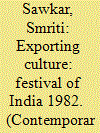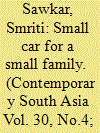| Srl | Item |
| 1 |
ID:
168571


|
|
|
|
|
| Summary/Abstract |
This article employs the concept of culture as a consumable resource in visually-mediated global markets. The Festival of India, first hosted in 1982 in Britain, was a unique state-sponsored spectacle that packaged Indian culture as a commodity for Western audiences. Indira Gandhi as Prime Minister took keen interest in the ‘visual scheme’ of India that was projected during the Festival, simultaneously conscious of her own image as she returned to power after the contentious rule of the ‘Emergency’. The article suggests that Gandhi sought to divert negative media attention on her regime by putting on display India’s ‘soft power’ in artistic and scientific fields. It further comments upon the diversity in the reception of the event by various audiences thereby challenging the notion of passivity often attributed to consumers of cultural performance. By examining how Gandhi and her advisors used culture as something ‘exportable’ to remake her image, the article seeks to place the Festival alongside similar spectacles staged in the early 1980s when Gandhi’s leadership faced a crisis of legitimacy, both at home and abroad.
|
|
|
|
|
|
|
|
|
|
|
|
|
|
|
|
| 2 |
ID:
190162


|
|
|
|
|
| Summary/Abstract |
The Maruti Suzuki joint venture between the Government of India and the Japanese Suzuki Motor Corporation in 1983 launched India’s first ‘people’s car’ – the Maruti 800. This article argues that the conceptualisation and promotion of the Maruti 800 as the ideal car for a small, middle class family revealed subtle continuities with the controversial family planning programme of the state which had reached its peak during the internal ‘Emergency’ of 1975. By associating the Maruti 800 – an object of aspiration for an emerging middle class and of at least potential mass consumption – with a small family, the state reiterated its message of population control albeit subliminally. The article further suggests that the adoption of Japanese management practices at Maruti, which laid emphasis on hard work and loyalty to the company-family, was in line with Prime Minister Indira Gandhi’s desire to enforce discipline and enhance labour productivity, a notion also vocalised during the Emergency. Finally, the article illustrates how the ‘people’s car’ project placed the Indian state as the ‘driver’ of middle class aspirations and mobility in 1980s’ India, a full decade before the liberalisation reforms of 1991.
|
|
|
|
|
|
|
|
|
|
|
|
|
|
|
|